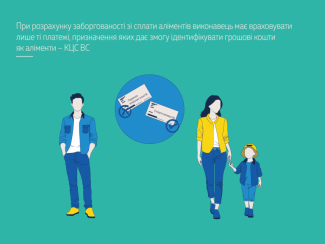Contact center of the Ukrainian Judiciary 044 207-35-46

The fact that a debtor transfers money to the recipient without specifying that the payments are intended as child support cannot automatically be regarded as fulfilling child support obligations, even if there are no other debts between the parties.
Such conclusions were reached by the Supreme Court as part of the panel of judges of the Second Judicial Chamber of the Civil Cassation Court.
In the case under review, the claimant filed a complaint against the actions of a state enforcement officer, stating that, when calculating child support arrears for the maintenance of the parties’ common son, the enforcement officer had wrongly counted sums transferred by the debtor during the disputed period as voluntary child support payments.
The claimant argued that such actions of the enforcement officer were unlawful, as the funds transferred by the debtor to her account could not be regarded as payment of child support arrears. She explained that these transfers were made to cover expenses related to the agricultural processing of a land plot belonging to the debtor.
The court dismissed the complaint, reasoning that the debtor had no other financial obligations to the claimant apart from child support. At the same time, the court rejected the claimant's reference to the fact that the funds paid by the debtor to her according to the receipts provided by him were spent on cultivating the land plot owned by the debtor, as only one receipt confirms that she paid the land tax for the debtor from the account indicated by the claimant as an account for the payment of child support when writing an application to the state enforcement officer for the crediting of child support.
The Civil Cassation Court of the Supreme Court disagreed with the conclusions of the lower courts and made the following legal findings.
The procedure for collecting child support is defined by law. The enforcement officer collects child support from the debtor in the amount determined by the enforcement document, but not less than the minimum guaranteed amount established by the Family Code of Ukraine.
The calculation of child support arrears is carried out by the enforcement officer in the Automated Enforcement Proceedings System based on information obtained from: reports on deductions and payments made; payment receipts (or copies thereof) confirming child support payments provided by the claimant or the debtor; statements and/or acknowledgments by the claimant; information on the average wage in the locality; other documents reflecting the debtor’s income or payments made as child support.
The Civil Cassation Court noted that the lower courts had failed to pay attention to the fact that only two payment receipts contained a payment purpose that allowed the funds to be identified as child support, while the remaining receipts did not reference child support in the payment details. Instead, the purpose was stated simply as “transfer of own funds”, which does not make it possible to identify the money as payment of child support.
Summarizing its conclusions, the Civil Cassation Court of the Supreme Court found that the lower courts had incorrectly concluded there were no grounds to satisfy the complaint. The Court partially upheld the claimant’s complaint against the actions of the state enforcement officer and clarified that, when calculating child support arrears, the enforcement officer may treat as voluntary child support payments only those transfers whose payment purpose clearly indicates “child support” or “child maintenance debt”. Transfers indicating “transfer of own funds” without further specification cannot automatically be considered as child support payments, even in the absence of other debts between the parties.
Resolution of the Supreme Court of 5 August 2025 in case No. 390/2379/24 (proceeding No. 61-7389св25) – https://reyestr.court.gov.ua/Review/129373461.
This and other legal positions of the Supreme Court can be found in the Database of Legal Positions of the Supreme Court - https://lpd.court.gov.ua.